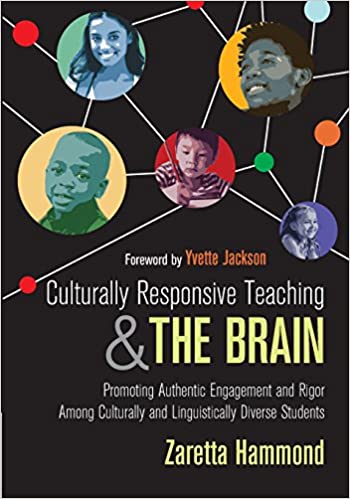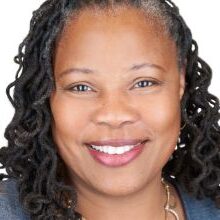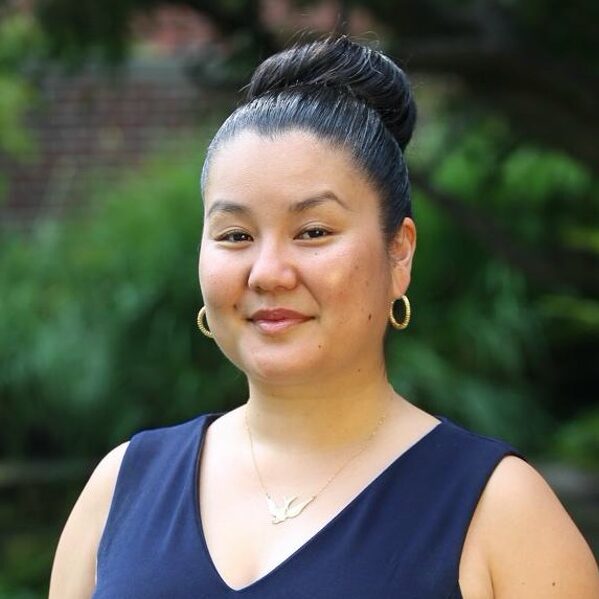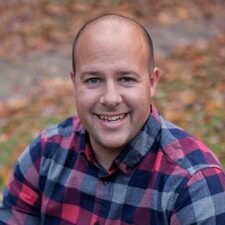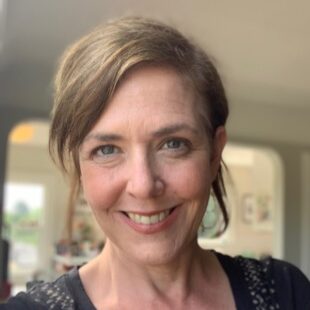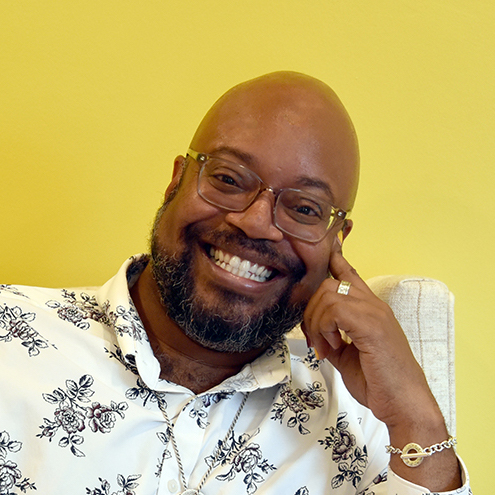October 8, 2021
Redefining Our Classrooms,
Schedule
Welcome to the 2021 NWAIS Fall Educators Conference
Help Desk/Registration
Opening Remarks
Keynote Address: Zaretta Hammond
These sessions will be recorded and available asynchronously for two weeks following the conference.
Zaretta Hammond, M.A.
Zaretta Hammond, M.A. is a national consultant and author of Culturally Responsive Teaching and Brain: Promoting Authentic Engagement and Rigor for Culturally and Linguistically Diverse Students. She is a former high school and community college expository writing instructor who is passionate about the intersection of literacy, equity and neuroscience. She has published articles in Educational Leadership, The Learning Professional, and Phi Delta Kappan.
Live Q&A to follow!
All Divisions: Diversity, Equity and Belonging, Social Emotional Learning, Classroom Practice
Break
Session A: Featured Speakers and Breakout Sessions
Featured Speakers
A1. Know History, Know Self: An Educator’s Journey
Christina Villareal, Ph.D.
What does it mean to be in relation with and for Ethnic Studies? Through storytelling, this session will focus on the relationship between knowing history and knowing self and interrogating the ways that educational institutions – and those of us that work within and in spite of them – both affirm and deny the dignity and lived experiences of young people. Creating humanizing experiences through Ethnic Studies requires each of us to allow our full humanity to show up in the work that we do and the paths that we walk.
* This session will not be recorded or available after the conference
All Divisions: Diversity, Equity and Belonging
A2. Post-Covid Learners: What the Pandemic taught us about our kids, and how to shift our practices towards an adaptable future
These sessions will be recorded and available asynchronously for two weeks following the conference.
A.J. Juliani
Our learners today live in a completely different world than we did 25, 15, or even 10 years ago. Students have access to on-demand information with the click of a button on their phones. In today’s world, technology is growing exponentially, change is an expected part of our lives, and we have tools that have revolutionized the way we think about teaching and learning.
Yet, on the fundamental level of learning, we know that all of this change needs to be channeled for it to have a positive impact on our students and in our classrooms. This session goes into detail on how to build a student-centered classroom that promotes adaptable learning experiences for all students.
Attendees will learn:
- how student-choice fuels engagement
- how to use technology with a learning purpose
- what innovative teaching practices impact a diverse set of learners
- why student-centered classrooms promote equity and ownership of learning
Innovation in education starts with our students. It strengthens relationships, and deepens learning experiences. Student choice and technology allow teachers to build true engagement with all students regardless of their background.
All Divisions: Classroom Practice
A3. Reconnection and Relationships: Supporting our students sense of belonging in 2021
These sessions will be recorded and available asynchronously for two weeks following the conference.
Kristin Daniel, Ed.D.
Over the last twenty months, student wellbeing has been disrupted and set back. When schools closed and adopted online learning models, students experienced a loss of structure, support, and most importantly a lack of belonging. Many students, even those that had done well in school before, began to slip through the cracks by not showing up, not turning in work, and being increasingly more disengaged. Other students experienced profound social and emotional distress. Now it’s time to provide our students a sense of safety, calm, and most importantly, meaningful connection.
At its core, school is a social construct that is made up of thousands of human interactions each day. As educators, how we connect, respond, and create a sense of belonging with our students must frame how we engage with their learning. In this session, we will look through the student lens to see how a student experiences the relational aspect at school and what can happen when it is missing. We will learn strategies to help increase students’ sense of belonging, trust, and safety. And we will discuss how to integrate student agency to improve how we relate and connect in meaningful ways with all of our students. Student social and emotional learning should be at the center of how all adults at a school engage, interact, and connect with our students.
All Divisions: Social Emotional Learning
BREAKOUT SESSIONS
A4. The Transformed Classroom
Lupe Fisch, Chris Hooten, & Hudson Harper, The Downtown School
This past year has given us the opportunity to expand our toolbox in a variety of ways. In this session we will share both the technical and pedagogical lessons we learned and how a deeper mastery of the blended classroom impacted our students’ learning and how we can use these lessons to improve learning as we head back into the traditional classroom. The session will be interactive, include student perspective, and elicit participant input and reflection.
Upper School: Math, Social Studies, English, World Languages
A5. Using Proficiency to Bring Educational Equity to the Classroom!
Mark Siegel, Delphian School
Covid-19 only added to the reasons that schools and classrooms must transition from time-based to proficiency-based models, where students master each step before moving on. Find out about the logical next step in personalized, student-centered education. Learn how schools are moving to this model, classroom by classroom, where teachers put students in the driver’s seat of their own education! In this interactive seminar, learn of practical approaches teachers can use to educate students where they are and ensure mastery before moving on.
Middle and Upper School: Math, Science, Social Studies, English, World Languages, Technology, Faculty Development, Organizational Development
A6. Rediscovering Research Partnerships in a Year of Uncertainty
By Susanne Everill & Nikki Fast Lee, Charles Wright Academy
As a classroom teacher and a librarian, we spent last fall struggling to find time to collaborate on middle school humanities projects due to job shifts and pandemic-related restrictions. However, we ended the year co-teaching a history course and embedding information literacy skills into English projects, and observing incredible learning and engagement from our students along the way!
In this session, we will share our top tips for successful classroom-library partnership and reflect on what we learned from this unprecedented year. Attendees will learn strategies for effective collaboration and co-planning, integrating skills and outcomes from both information literacy and disciplinary standards. We will share a sample timeline, project structure, and a breakdown of how we divided teaching and assessment between the teacher and librarian. While our examples are from 7th and 8th grade history and English classes, the principles are applicable to any middle or high school class.
Middle and Upper School: Social Studies, English, Library
A7. Lessons Learned: How to Make Outdoor Learning Possible
By Melissa Chance, M. Ed, Instructional Leadership
I know that getting outside is good for mine and my students health, but what are the real benefits of outdoor learning? Have you been wondering how to get your students outside during hybrid learning? How can I get my students outside if I don’t teach PE and science-based subjects? What can I do to adapt my curriculum for any age? All these questions will be addressed and examples given on how I made this possible in my middle school!
All Divisions: Math, Science, Social Studies, Arts, English, Phys Ed, Social Emotional, Faculty Development, Diversity, Equity and Social Justice
A8. Queering in the Classroom: Fostering Radical Inclusion
By Kevin McKenna, The Overlake School
Applying a queer framework to our teaching and classroom practices can foster the radical inclusion of students of all identities and backgrounds, not just LGBTQ+ students. In this workshop, I will explain a queer framework for thinking about inclusive pedagogical practices. Participants will do an activity applying that framework, and we will collectively generate ideas for inclusive classroom practices grounded in this exercise.
Lower, Middle and Upper School: Math, Science, Social Studies, Arts, English, Phys Ed, World Languages, Social Emotional, Faculty Development, Diversity, Equity and Social Justice
A9. Take Your Inventory to Avoid Microaggressions
By Kimberlee Williams, The Bush School
In this session I invite participants to do a deep dive on an inventory of their journey in underlying beliefs about groups that they belong to and are outside of. Participants create this inventory during the workshop and will be able to use it for years to come. Participants may also guide students to create their own inventories and to begin reducing the harm that they are potentially causing through microaggressions. This inventory unearths the underlying beliefs helping participants to begin to intentionally expose themselves to differing views and messaging about these groups, thereby preventing or significantly reducing microaggressions.
All Divisions: Diversity, Equity and Belonging
A10. Cognitive Load Theory: The “Single Most Important Thing for Teachers to Know”
Zach Groshell, The Northwest School
Interest in cognitive load theory has exploded in recent years, with educationalist Dylan Wiliam describing the theory as the “single most important thing for teachers to know.” More than just an abstract idea, cognitive load theory is a framework of practical recommendations that teachers across all subjects can use to optimize student learning. The session presenter will engage participants with visuals and storytelling around the teaching strategies recommended by cognitive load theory, draw connections between the theory and real classroom scenarios, and conclude with activities that have teachers applying their new understandings to redesign conventional instructional materials that often lead to cognitive “overload.”
All Divisions: Math, Science, Social Studies, Arts, English, Phys Ed, World Languages, Technology, Faculty Development, Global Education, Diversity, Equity and Social Justice
A11. Rainier Scholars Presents: Reflections on Equity and Inclusion in the Independent School Classroom
By A Panel of Rainier Scholars
In keeping with the conference theme of Redefining Our Classrooms, Reconnecting Our Communities, staff members and scholars from Rainier Scholars will present a thought-provoking breakout starting with our own self-reflection as an organization. We will also share emergent themes from scholars who navigated the world of independent schools in Seattle. With many scholars now moving through their college experience and entering the workforce, we have an opportunity to hear about their lived experiences and do better as institutions. These experiences will be framed for the educator in the classroom and the lunchroom, teaching remotely or in person, navigating many new challenges presented by the global pandemic and some sadly familiar challenges presented by the ongoing pandemic of inequity and injustice.
The mission of Rainier Scholars is to cultivate the academic potential and leadership skills of hard-working, underrepresented students of color. By creating access to transformative educational and career opportunities and providing comprehensive support to scholars and families, we increase college graduation rates and empower new generations of leaders.
Middle and Upper School: Math, Science, Social Studies, Arts, English, Phys Ed, World Languages, Technology, Faculty Development, Global Education, Diversity, Equity and Social Justice
Lunch & Wellness Break
More info coming soon!
Session B: Featured Speakers and Breakout Sessions
Featured Speakers
B1. Toward Healing Centered Engagement, Humanization, and Liberation
Christina Villareal, Ph.D.
This session will introduce participants to Healing Centered Engagement (Ginwright, 2015) by reflecting on our varied relationships to systems and histories of oppression and how these histories show up in our daily work. We will examine some healing centered approaches to address manifestations of intergenerational trauma, harm, and toxic stress in our bodies, classrooms, and communities, and the central role that intergenerational healing plays in the ongoing struggle for our humanity and liberation.
* This session will not be recorded or available after the conference
All Divisions: Diversity, Equity and Belonging
B2. The Epic Guide to Engagement
These sessions will be recorded and available asynchronously for two weeks following the conference.
A.J. Juliani
We all want to engage students at a higher level. But how do we do that?
The key to engagement is high attention and high commitment from our students. However, in order to foster that attention and commitment, we must allow students to motivate themselves and each other through choice-based work.
In this workshop, A.J. Juliani will tackle these five strategies that work to engage students at every grade level and inspire innovative work:
- Choice-based instruction
- Inquiry-based projects
- Authentic audience
- Competitive Challenges
- Launching to the World
Join A.J. for an interactive session to learn how to develop student-centered activities with choice and inquiry. He will field questions from attendees after his presentation. This session will benefit K-12 teachers and administrators.
All Divisions: Classroom Practice
B3. “Together, We Are Resilient”: How Adult SEL and Efficacy build our capacity for the future
These sessions will be recorded and available asynchronously for two weeks following the conference.
Kristin Daniel, Ed.D.
The past two years have shown us time and again the resilience that so many of you have demonstrated when faced with chaos and uncertainty. You are resilient. We know that resilience is a set of skills we can learn, practice, and build upon. These skills help us to cope, adapt, and become stronger over time. But as we anticipate the possible uncertainties ahead, how can we sustain this resilience and protect our wellbeing over time? When educators come together with a shared belief that they can collectively overcome adversity, they will be more successful.
During this session, Kristin will share the stories of resilience, compassion, and adaptation she has witnessed through her work with schools around the world. Relying on decades of research on resilience and efficacy, she will share how adult SEL competencies impact how we as a faculty and staff feel more empowered and collaborative. And finally, she will guide you in creating your “future stories” of how you and your school community can come together to face whatever this school year brings, stronger and more connected.
All Divisions: Social Emotional Learning
BREAKOUT SESSIONS
B4. Beyond the Test: Rethinking Assessment in the Math Classroom
Lynn Ellis, Parabola Magic Consulting
This session helps middle and upper school math teachers create options for assessment that go beyond the quiz and the test, inspiring creativity in designing application-based assessments that truly showcase the learning of students.
Middle and Upper School: Math
B5. The Modern Classroom: Leveraging Blended Learning to Create Self-Paced and Mastery-Based Classrooms
Erin Blaser, Westside School & Kate Gaskill, Head of Teaching and Learning, Modern Classrooms Project
As educators, we know that students learn at different speeds. Our job is to differentiate our practice to meet them where they are at in their education journey. So how do we do that effectively? In this session, explore how teachers have leveraged blended learning tools to transform their classrooms into self-paced, mastery-based environments. See examples of how to further foster inquiry and ensure equity in sustainable, data-driven classrooms. Explore blended learning tools and strategies, and leave with resources and connections with teacher experts from the Modern Classrooms Project, a non-profit that empowers teachers to reimagine their classrooms.
Lower, Middle and Upper School: Math, Science, Social Studies, English, Technology
B6. Assessing and Improving Safety Culture on Outdoor and Experiential Programs
Jeff Baierlein, Director, Viristar
Outdoor and experiential programs offer students an unparalleled opportunity to connect with each other, themselves, their teachers, and a love for learning. But this only happens where there’s a positive culture of safety—both physical and psychological. This workshop will explore the meaning of ‘culture’ and ‘safety culture’ and help participants understand how to recognize, evaluate and improve their school’s culture of safety, particularly with respect to the school’s outdoor, travel, adventure and experiential programming.
Lower, Middle and Upper School: Phys Ed, Social Emotional, Outdoor/experiential education
B7. SEL and ABAR: What We’ve Learned and Where We’re Going
Caitlin Lyons, Wild Ones Consulting & Achijah Berry, Seattle Academy of Arts & Sciences
In this session, participants will reflect on their own connection to SEL and ABAR work and begin to create their own personal definition of these terms. Through experiential activities, we will help participants practice SEL and ABAR related exercises to deepen their understanding of the work and to gain practical skills they can use right away. Finally, participants will have a chance to work in small groups using different lesson planning frameworks so they can help bring this work to their communities.
Middle and Upper School: Social Emotional, Diversity, Equity and Social Justice
B8. Mastery-Based Grading: Our Journey to More Equitable and Engaging Grading System
Tyler Hartanov & Chelsea Andrada, Seattle Academy of Arts & Sciences
Tired of hearing from students, “How do I improve my grade?” Join us in discussing how we reworked our grading system to define student learning goals and develop a system that helps to empower students to take control of their learning and provides targeted equitable feedback that advances learning.
Middle and Upper School: Math, Social Studies, English, Social Emotional
B9. Evolving the “3 Rs” Methodology in a Post-Pandemic Classroom
Brandon Farrar, Giddens School
As we see the light at the end of the tunnel, it is tempting to go back and conduct education business as usual. With all the trauma of the past year, it has also provided a crash course on what students require most (hint: it’s not reading, writing, and arithmetic). Come ready to share your story and take away “3 New Rs” that focus on community, equity, and student empowerment.
All Divisions: Math, Science, Social Studies, English, Technology, Social Emotional, Diversity, Equity and Social Justice
B10. Powerful Faculty Support Groups
By Hannah McHugh, Seattle Girls’ School
Faculty Support Groups provide space for faculty members to connect, celebrate, and be supported. Come experience the power of holding space for others and being held through intentional listening. Learn the benefits and tools of providing faculty spaces within your community.
All Divisions: Faculty Development
B11. Early Career Educators Session: For Teachers in Their First Three Years
Regan Wensnahan, The Little School; Michelle Harrison, The Evergreen School
Join teachers who are also in the first few years of their time in the educational profession. Participants will connect, share stories. laugh and learn together. Brought to you by the Faculty of the NWAIS Institute for Early Career Educators
All Divisions: Faculty Development
Break
Closing Keynote: The Power of One – Love Itself is a Revolutionary Act
These sessions will be recorded and available asynchronously for two weeks following the conference.
The Power of One: Love Itself Is a Revolutionary Act
Rodney Glasgow, PhD
The closing session will use personal storytelling to highlight the importance of self-actualization and self-advocacy, as well as the most intimate form of activism – one person standing for their sense of right. Looking at contemporary issues such as the Black Lives Matter versus the All Lives Matter debate, the keynote will explore how do you make your life matter. Together, we will explore the power of an individual to effect grand change by leading a life of bold authenticity.
Live Q&A to follow!

